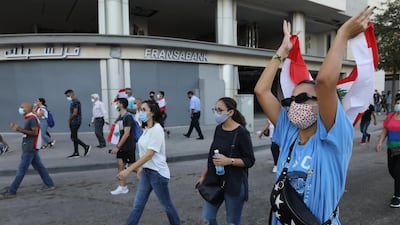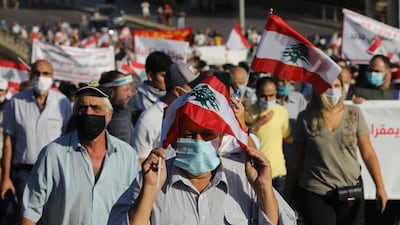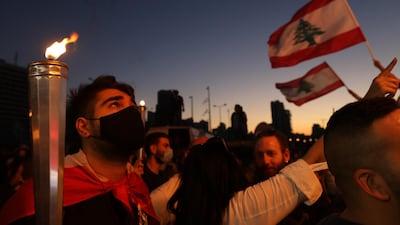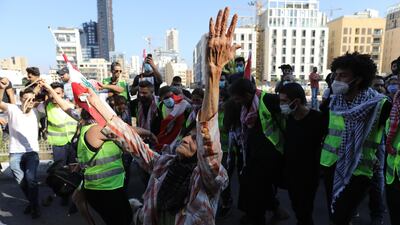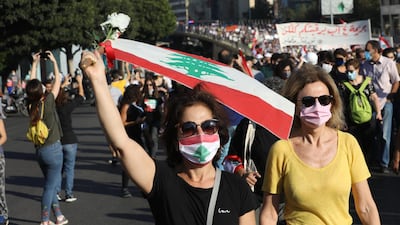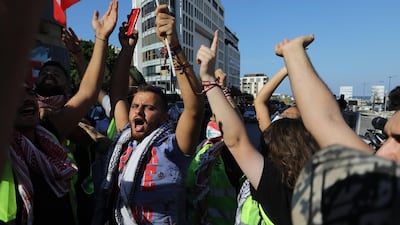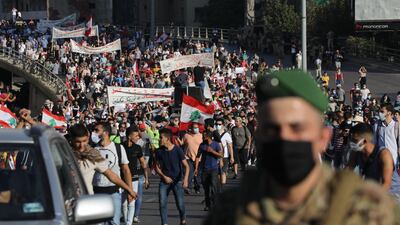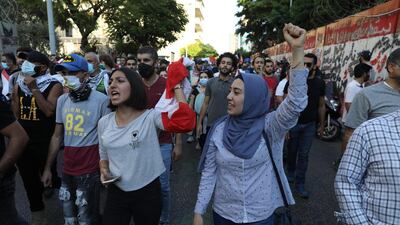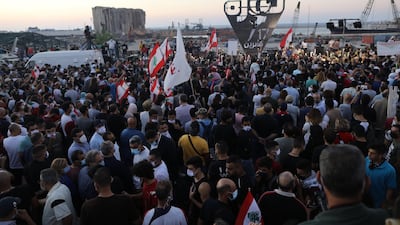“Independence? What independence?” Tony Maalouleh scoffed when asked what he thought of Lebanon’s 77th anniversary of self-governance on Sunday.
Like many Lebanese, Mr Maalouleh said he had nothing to celebrate this year.
Lebanon has been hit by a long list of calamities in 2020: an economic crisis after decades of mismanagement, soaring unemployment and poverty, a political vacuum, and a devastating explosion that killed at least 190 people at Beirut’s port in August.
Walking beside her husband, Marianne Maalouleh lifted her arm to show a long pink scar that went from her armpit almost to her elbow.
She described how medical workers had put her on tissue paper on the floor while they stapled the wound shut.
“It was pandemonium. The hospital was devastated,” Ms Maalouleh said.
“You can forget wars. But this, you can’t,” said her husband, as he pulled out his phone to show a video of his home after the blast.
The floor of the apartment is covered with blood. His mother, 80, stares blankly ahead.
In the main street of the badly damaged neighbourhood of Mar Mikhael, close to the port, the trauma of the blast lingers.
Once full of lively restaurants and hip shops, it is now littered with building material, rubbish and haggard-looking elderly people asking for help.
“Look around us. The houses are empty. Everyone’s left,” said Mr Maalouleh, who had to borrow 15 million Lebanese pounds from his sister to fix his house and received no financial support from the government or NGOs.
That is $10,000 at the official, yet defunct, exchange rate, or $1,875 on the black-market, which has been used for the past year as a benchmark for everyday transactions since the local currency crashed.
Lebanon has been without a functioning government since August 11, when Prime Minister Hassan Diab resigned after the port explosion. His successor, prime minister-designate Saad Hariri, is struggling to form a new Cabinet.
Lebanon’s President Michel Aoun cancelled all Independence Day celebrations this year, including the traditional military parade, because of the coronavirus pandemic.
Many Lebanese feel helpless.
“We are dependent on our corrupt leaders and interference from other countries,” said opera singer Matteo El Khodr, 35m, as he walked home after a jog around Mar Mikhael.
“This is not true independence."
Lebanon’s religious groups historically received support from various foreign powers eager to consolidate their influence in the region.
French President Emmanuel Macron led international efforts to help Lebanon after the port explosion, but his demands for more transparency and accountability from the country’s political class yielded no results.
But no international aid will be unlocked without reform, he and the IMF said.
Politicians blame each other for resisting change but their accusations are vague, fuelling popular belief that all politicians support each other in a vast network of corruption.
Although widely welcomed as Lebanon’s last chance for economic recovery, France’s attempt to pressure Lebanese leaders is also viewed with suspicion.
“No one does a favour for nothing,” said Elias, 26, a banker. “They might give us money but they want our petrol."
He was referring to French oil giant Total, one of three international companies – one Russian, one Italian – that are exploring offshore oil and gas in Lebanese waters.
Although politicians regularly promise the Lebanese that offshore drilling will bring in quick cash to the suffering economy, experts say that even if found, hydrocarbons could take years to be exploited commercially.
Elias was cycling in Mar Mikhael with friends. They stopped seeing each other at home for fear of exposing their parents to Covid-19.
The young men worry about their future and dream of emigrating.
“In the past year, 700 out of 2,500 people have been fired at my bank,” said Elias, who believes that he would also lose his job.
“Soon, government subsidies are going to be lifted and the price of 20 litres of gas-oil will reach 100,000 Lebanese pounds. That’s a 10th of my salary."
The central bank's governor has repeatedly warned that he will have to stop subsidising basic goods in the coming weeks. The bank is running out of money.
“Nobody is happy,” said Mohieddine, an accountant at a private hospital.
Another cyclist drove past them, laughing as he rode with no hands.
“Except for him – he’s probably emigrating next week,” Elias said. They all laughed.

